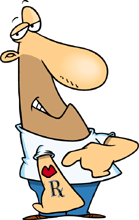
Weekly Gems from Ronda Gates.
 | Weekly Message
Weekly Gems from Ronda Gates. |
|
Lots of changes have taken place at your local pharmacy in recent years. There is an abundance of over-the-counter products, herbs and vitamin and mineral supplements for you to choose from. Since many of these medications used to require a prescription this can create confusion. This awesome array and availability has lead to self-prescribing for a variety of ailments. Although the ability to create your own assortment of drugs is liberating it also exposes you to potential harm. For example, people with chronic medical conditions such as high blood pressure or diabetes should avoid many of these over-the-counter preparations, including popular herbal supplements advertised without proper warnings. Cancer patients are also at risk when the drugs that can allay their disease react with other medications, vitamins, herbs and foods that may have been part of a pre-diagnosis regimen. With rare exceptions, only a pharmacist is equipped with the comprehensive educational background and testing that, when combined with sophisticated computerized databases of information, can assure the medicines you take heal without harm.  If you get all your prescriptions at the same location your pharmacy probably has a computerized record of your prescriptions that will reveal interactions with other medications -- if your pharmacist knows what else you are taking. If you prepare a list of every diagnosed ailment, allergy, prescription, past drug reaction, over the counter medication, herbal and vitamin mineral supplement and take it to your pharmacist, this information can be used to update your records and make certain you are not at risk for a drug interaction. This is particularly important if you are seeing several doctors (and dentists, who also prescribe) for a variety of ailments. Keep a record of this information in a place you'll see often and where it can be easily accessed in case of an emergency. I keep mine rolled in a recycled prescription bottle in my refrigerator. I've also got a slip of paper there that lists the telephone numbers of my physicians, pharmacist , the police department, poison control center and fire department. When you get a new prescription you should always have a conversation about the drug with your pharmacist. Learn the name of your medication and its strength, when, how often and how long you should take it, side effects you might experience, special instructions or storage information, and whether the prescription is renewable. Some drugs need to be taken on a schedule. Some are short term or for symptom relief and some are long term to prevent or treat a chronic condition. Ask what you should do if you miss a dose and whether your drug requires you avoid alcohol, certain foods or sunlight, for example. If you don't know why you were prescribed the drug, your pharmacist may be able to give you some insight. Although pharmacies have many safeguards to make certain your prescription is filled correctly, on rare occasions mistakes are made and someone gets the wrong medication or the wrong dose of a medication. You can prevent errors by having prescriptions refilled before you use your last pill so you can compare the old and new to be assured the color or shape of your tablet or capsule is identical. Your pharmacist is the primary intermediary between you and your doctor. Doctor's diagnose and prescribe, but when it comes to knowledge about those impressive displays of products behind and in front of the pharmacy counter, only your pharmacist knows for sure. |
| Weekly Messages | Lifestyles |
|
|
1378 Casada Ct, Leisure World Mesa, AZ 85206 Phone: 480-242-4812 |
| Web Site Design by JDL Design | |